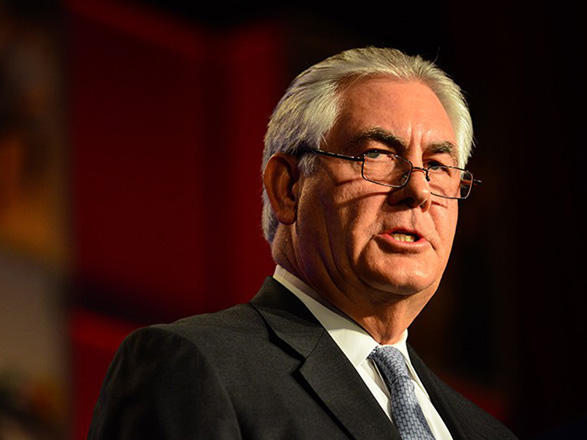Iranian nuclear deal faces threats

By Kamila Aliyeva
The long-anticipated Iranian nuclear deal, the greatest achievement of the Obama administration which seemed to resolve one of the most complex and lasting international crises of recent times, is under threat, as the positions of the Islamic Republic and the United States are becoming rigid, uncompromising and even aggressive.
Lately, the U.S. Secretary of State, Rex Tillerson, sharply criticized the agreement on the peaceful nature of Iran's nuclear program, while the Trump administration launched a review of its policy towards Tehran, thereby escalating the relations between the two countries.
Iran’s nuclear ambitions and provocative actions are a grave risk to international peace and security, the U.S. Secretary of State said adding that JCPOA “only delays their goal of becoming a nuclear state.”
He also responded evasively to the question on whether the U.S. should break out of the deal, but again confirmed that “we have to look at Iran in a very comprehensive way in terms of the threat it poses in all areas, of the region and the world, and the JCPOA is just one element of that.”
Making remarks on the recent statements by U.S., Iranian Foreign Minister Mohammad Javad Zarif recommended his American counterpart to learn about the failures of past U.S. statesmen who supported antagonistic policy towards Iran.
The JCPOA is the result of a revision by its predecessors of a wrong policy against Iran and the region as a whole, according to the Minister.
Actually, the idea set forth by Tillerson is not new. Even during his election campaign, U.S. President Donald Trump criticized Obama for the deal with Iran, which he even described as "one of the worst negotiated ever."
Also, the review of the deal might be viewed by many as a pressure to Tehran, which actively supports militant groups such as Lebanon-based Hezbollah and Hamas in the Gaza Strip, as well as Houthi fighters in Yemen and President Bashar Assad’s military in Syria, which the U.S. opposes.
Tehran, meanwhile, is preparing in its own way for a possible deterioration of the already difficult relations with Washington. Like Russia, Iran is not ready to concede to the Americans on the Syrian issue and intends to support Bashar al-Assad to the last, despite any accusations of using chemical weapons.
In connection with the nuclear accord, Iran says it "honors its obligations", and as the deal was concluded with the participation of the United Nations and is international, the U.S. alone does not have the right to abolish it.
Yet, a real review of the Vienna agreement with Iran looks extremely unlikely, as there are practically no legal opportunities for the United States. The deal was approved at the level of the UN Security Council, therefore, Trump has to convince, at least, China and Russia to review the deal. In addition, it is not clear what arguments can be used, as there is no information that Iran has taken any actions that contradict the JCPOA.
The current position of the United States could have really influenced the alignment of forces during the election campaign in Iran.
Their main intrigue of the forthcoming election in Iran became the appearance of unexpected candidacy - ex-President Mahmoud Ahmanidjad, who expressed the desire to take part in the election race. The whole crisis of Iran's intransigence on its nuclear program is strongly associated with his name.
He described the 2015 nuclear deal as “not clear” in his recent interview.
“In my opinion, the way information was given was incorrect. And then we saw what was said did not materialize. Sanctions continued, new sanctions were imposed, some of them were extended. In the agreement, the capacity for legal follow-up had not been envisaged,” he said.
However, on April 21, the Council of the Islamic Revolutionary Guard denied Ahmadinejad of his participation in the presidential elections scheduled for May, 19.
The U.S. agencies will develop recommendations to President Donald Trump on the nuclear deal with Iran within 90 days.
Earlier, Iranian supreme leader Ayatollah Khamenei warned that Tehran would retaliate if the United States breached the nuclear agreement.
Iran, five permanent UN Security Council members, Germany and the European Union signed the JCPOA in July 2015 to ensure the peaceful nature of Iran’s nuclear program. Then, the Islamic republic pledged to refrain from developing or acquiring nuclear weapons in exchange for the lifting of sanctions imposed against Iran.
The agreement provides that in return for verifiable abiding by its commitments, Iran receives relief from U.S., European Union, and UN Security Council nuclear-related economic sanctions.
At the same time, the U.S. retains sanctions against Iran on the missile program, human rights and on suspicion that Tehran sponsors terrorism.
---
Kamila Aliyeva is AzerNews’ staff journalist, follow her on Twitter: @Kami_Aliyeva
Follow us on Twitter @AzerNewsAz
Here we are to serve you with news right now. It does not cost much, but worth your attention.
Choose to support open, independent, quality journalism and subscribe on a monthly basis.
By subscribing to our online newspaper, you can have full digital access to all news, analysis, and much more.
You can also follow AzerNEWS on Twitter @AzerNewsAz or Facebook @AzerNewsNewspaper
Thank you!
